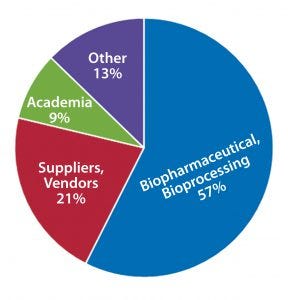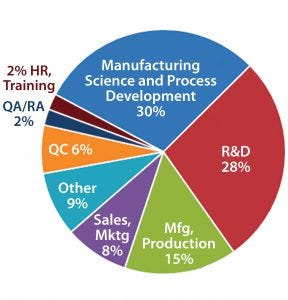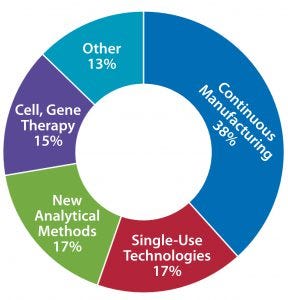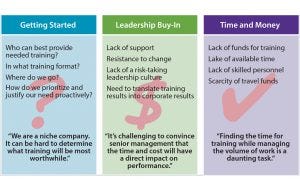Demographics and Trends: Results from a Joint BPI/BTEC Survey on TrainingDemographics and Trends: Results from a Joint BPI/BTEC Survey on Training
December 20, 2016

Figure 1A: Survey respondents represent a number of different organization types
Training is an investment. And it’s one that the authors, contributors, and other individuals behind this supplement understand well. However, the biopharmaceutical industry is much larger than these few individuals. It’s just as important to understand the motivators, drivers, and training-related challenges faced by the industry at large.
So BPI and BTEC jointly administered a short survey to gather some basic information from the magazine’s readership about the value and role that training plays in their organizations.

Figure 1B: Survey respondents represent a number of different job functions
According to survey respondents, professional development programs serve a range of purposes: e.g., driving increases in productivity, reducing deviations, increasing employee engagement, and increasing the overall technical skill base of the workforce.
Yet despite a great amount of common agreement about those benefits, nearly half of respondents (49%) feel that their organizations do not provide ample training and professional development to employees at all levels.

Table 1: Use of training resources depends on level and functional role of employees.
Where to Learn More
There is a robust landscape of organizations available to help the biopharmaceutical manufacturing industry meet its training, education, and professional development needs. As revealed in Table 1, many companies are effectively leveraging such resources to meet their professional development needs. For many others, however, professional development remains largely an internal activity. Although the listing below is not and cannot be comprehensive, it should provide an introduction to some of the types of resources available. In addition to these listed sources, other options include consultants, third-party training vendors, and academic degree programs.

Figure 2: Emerging technologies that pose the biggest challenge to companies with respect to learning and development
Government and University-Affiliated Biomanufacturing Training Centers: Biopharmaceutical manufacturing is increasingly recognized as a potential economic development engine in regional economies across the United States and rest of the world. To support a number of growing life-science clusters, a number of government and university agencies have opened professional development, education, and training centers. Here are just a few:
Biotechnical Institute of Maryland (http://biotechmd.org)
Golden LEAF Biomanufacturing Training and Education Center (BTEC) at North Carolina State University (www.btec.ncsu.edu)
National Center for Therapeutics Manufacturing (NCTM) at Texas A&M University (http://nctm.tamu.edu)
National Institute for Bioprocessing Research and Training (NIBRT) in Dublin, Ireland (www.nibrt.ie)
Worcestor Polytechnic Institute’s Biomanufacturing Education and Training Center (http://wp.wpi.edu/betc).

Figure 3: Most companies face similar barriers in securing buy-in necessary for learning and development initiatives.
University Professional Development Providers: In addition to dedicated education and training centers, a tremendous number of universities offer scientific and technical professional development programs that are of interest to the biomanufacturing industry. Here are a few of those:
Keck Graduate Institute (www.kgi.edu/bioprocessing/bpat)
Massachusetts Institute of Technology Professional Education (http://professional.mit.edu)
Pennsylvania State University (www.huck.psu.edu/content/instrumentation-facilities/shared-fermentation-facility/training)
University College London (www.ucl.ac.uk)
University of Massachussets at Lowell’s Biomanufacturing Center (https://continuinged.uml.edu/corporate)
University of Rhode Island (http://web.uri.edu/prov/bpda).
Community College Programs: The past 10 years have brought about a proliferation of community college degree programs and nondegree workforce development programs focused on biomanufacturing, bioprocessing science, pharmaceutical manufacturing, and biotechnology. These are too numerous to list here, but the following resources may be useful in identifying degree and nondegree programs as well as competency frameworks and skill standards:
Bio-Link (www.bio-link.org)
Iowa Bioprocess Training Center at Indian Hills Community College (www.indianhills.edu)
Johnston Community College (www.johnstoncc.edu/about/workforce)
National Center for the Biotechnology Workforce (www.biotechworkforce.org)
North Carolina’s Bionetwork Capstone Center (www.ncbionetwork.org/capstone)
Northeast Biomanufacturing Center and Collaborative (www.biomanufacturing.org).
Professional Societies: The biopharmaceutical manufacturing workforce is diverse. Equally diverse are the many professional societies that support scientists, engineers, training professionals, and business leaders in the industry through formal professional development, certifications, and communities of practice. Here are a few of the most prominent:
AIChE SBE: American Institute of Chemical Engineers’ Society for Biological Engineering (www.aiche.org/sbe)
AME: Association for Manufacturing Excellence (www.ame.org)
APICS: American Production and Inventory Control Society (www.apics.org)
ASQ: American Society for Quality (www.asq.org)
ATD: Association for Talent Development (www.atd.org)
Automation Federation (www.AutomationFederation.org)
CASSS: California Separation Science Society (www.casss.org)
GMP TEA: Good Manufacturing Practice Training and Education Association (http://gmptea.net)
IASSC: International Association for Six Sigma Certification (www.iassc.org)
ISA: International Society of Automation (www.isa.org)
ISPE: International Society for Pharmaceutical Engineering (www.ispe.org)
ISPI: International Society for Performance Improvement (www.ispi.org)
LTEN: Life Sciences Trainers and Educators Network (www.l-ten.org)
PDA: Parenteral Drug Association (www.pda.org)
PMI: Project Management Institute (www.pmi.org)
Society for Industrial Microbiology (www.simbhq.org)
WIB: Women in Biotech (www.womeninbio.org).
Industry Conferences and Courses: A number of industry conferences — such as the annual BPI Conference and BPI Conference West — include training courses. Conferences themselves can be excellent sources of information:
CHI Conferences (www.healthtech.com)
IBC Life Sciences, an Informa business (www.ibclifesciences.com), primarily North America
Informa Life Sciences (www.informa-ls.com), primarily Europe.
You May Also Like






